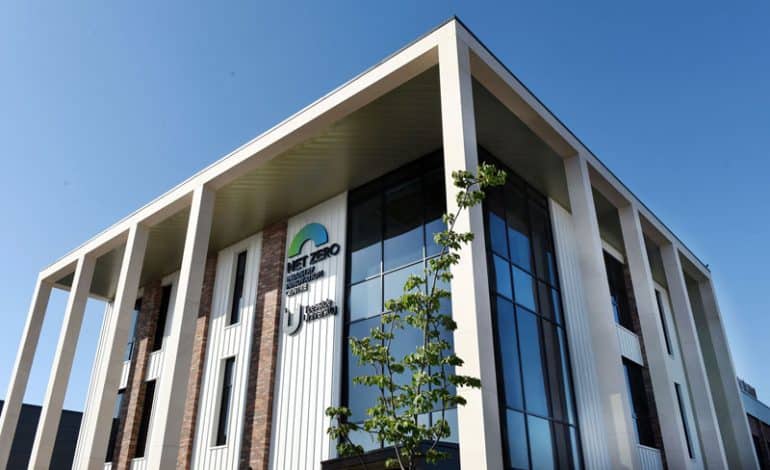Teesside University’s new Net Zero Industry Innovation Centre (NZIIC) is already providing an ‘ongoing legacy’ of green innovation for the Tees Valley according to an independent report.
The £13.1m facility, which opened for business earlier this year, is a national centre of excellence for net zero technologies and is set to position Teesside firmly at the heart of the UK’s green industrial revolution.
The report, written by Centrifuge Consulting, has been commissioned to analyse the impact of funding from the European Regional Development Fund (ERDF) and has found that it is already delivering vital support to regional businesses and is helping to create employment and innovation opportunities.
The NZIIC received almost £9m from the ERDF with additional funding from the Tees Valley Mayor and Combined Authority and Teesside University.
Its mission is to initiate change to address the climate emergency through industry partnerships, skills development, and research and innovation, and support Teesside University in achieving its commitment to become a net zero institution by 2030.
Centrifuge spoke to several key partners and businesses engaged with Teesside University.
The report states that the NZIIC is “directly addressing a number of challenges which are widely accepted as stifling the development of net zero innovation among SMEs and providing an ongoing legacy for the region”.
It also looked at the NZIIC’s support to local businesses and praised the variety of innovations being explored, including eliminating single-use plastics from the forestry sector; exploring opportunities in the maritime industry; and the reuse and/or reprocessing of polyester fabric.
The vast majority of businesses surveyed said that they were satisfied or extremely satisfied with the support from the NZIIC.
In particular there was 100% satisfaction with:
• Aiding the development of new net zero products to support, process or service business diversification.
• Exploring commercial opportunities around net zero through the re-use of by-products from existing processes and products.
• Reducing carbon emissions and the efficiency of existing products through the use of new components or processes.
• Reducing carbon emissions and enhancing efficiency of operations through re-use of by-products from existing processes and products.
One company which was interviewed for the report said: “They are providing academic support and know-how and access to cutting-edge technology.
“These are very intelligent people giving advice on what information is needed.
“They have an enormous skillset to support our own company’s skillset in developing new technology. We see them as a hotbed of knowledge.”
The report found that the employment gain directly attributable to support from the NZIIC over the next three years was 80 new jobs, with gross-value-added gain over the same period totalling almost £9m.
Dr Gari Harris, the Director of the NZIIC, said: “The NZIIC works to bring industry and academia together to develop new approaches to support the ongoing drive for clean energy and sustainability.
“It is fantastic to that our work has been validated by this report and to see evidence of the NZIIC’s success.
“We are delighted that in such a short space of time the NZIIC is already making a major impact and delivering real change within our community.”
Tees Valley Mayor Ben Houchen said: “The NZIIC is a vital part of our work as our region leads the way in the safer, healthier and cleaner industries of tomorrow. This report shows in black and white how the centre is supporting the net zero ambitions of our businesses, creating jobs and boosting our economy.
“The NZIIC is brilliantly complementing our game-changing low carbon schemes across the region by making sure all companies that want it can get top-quality backing to innovate and decarbonise.”








